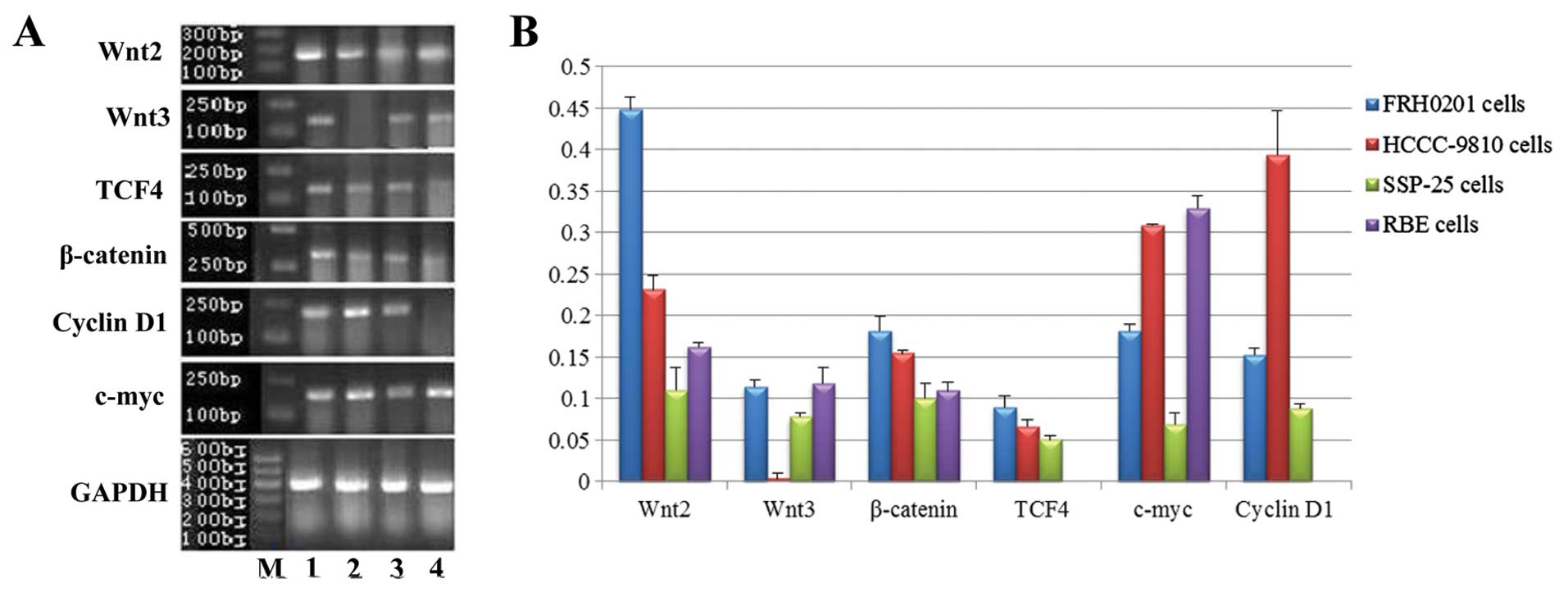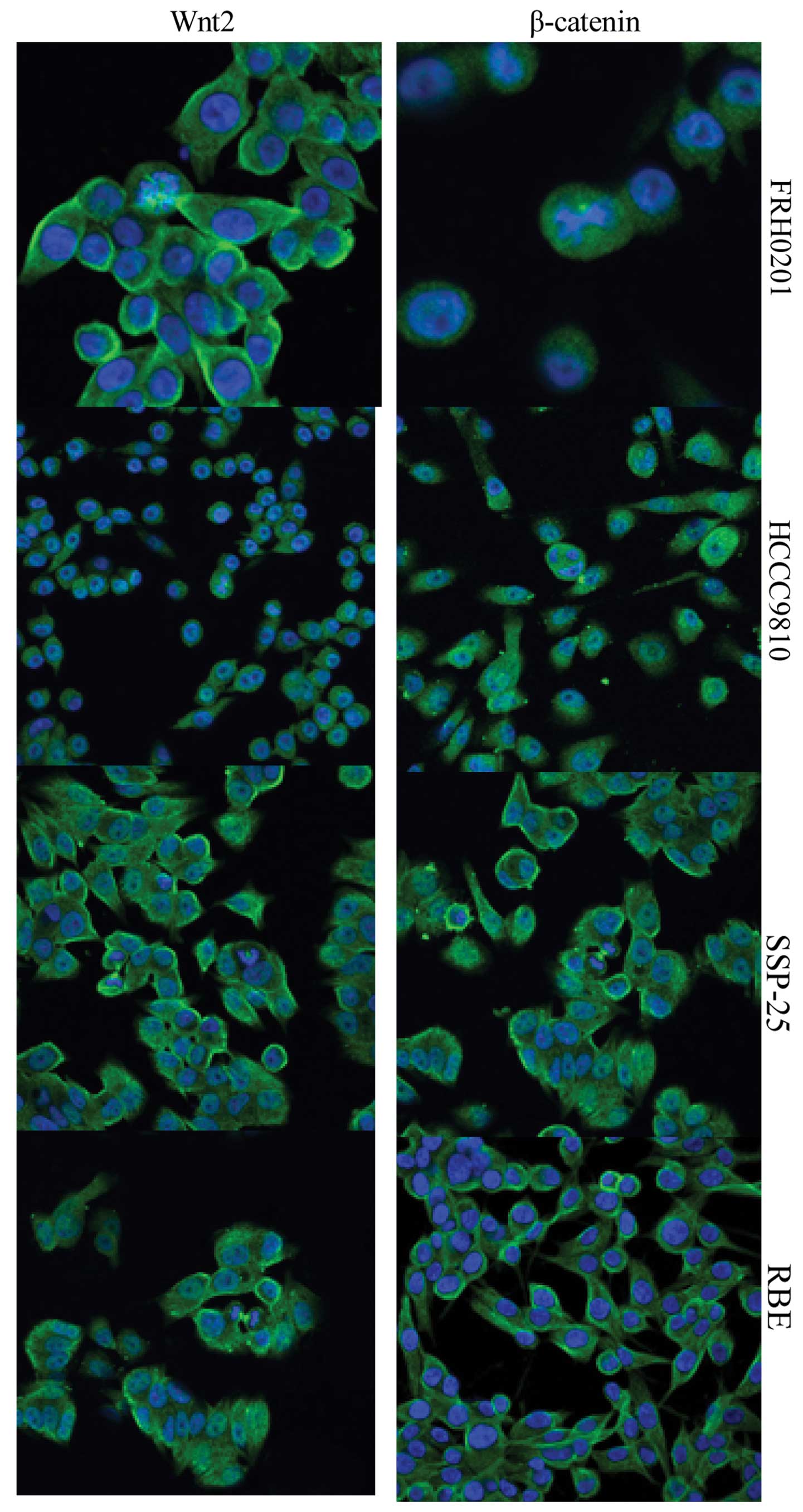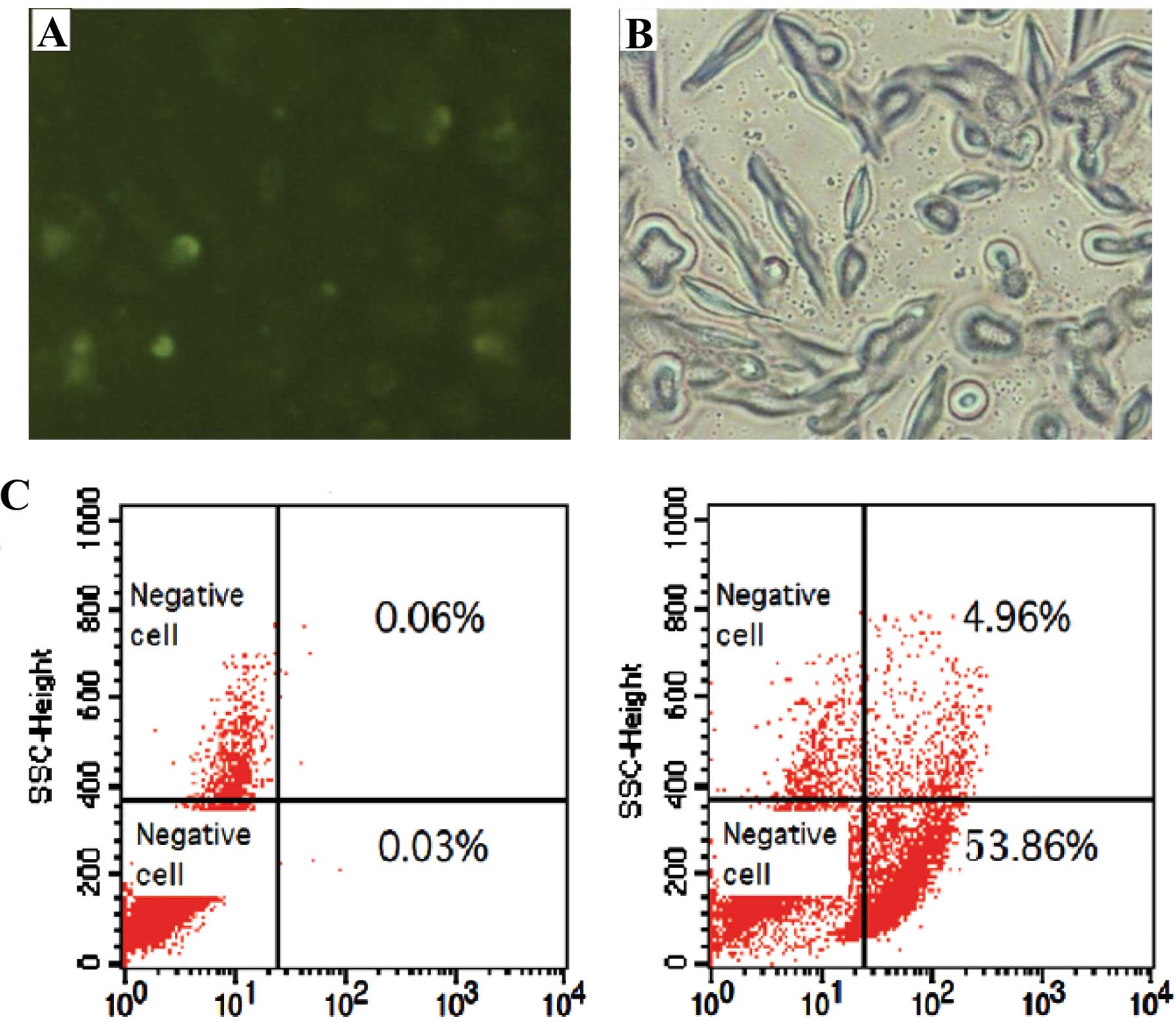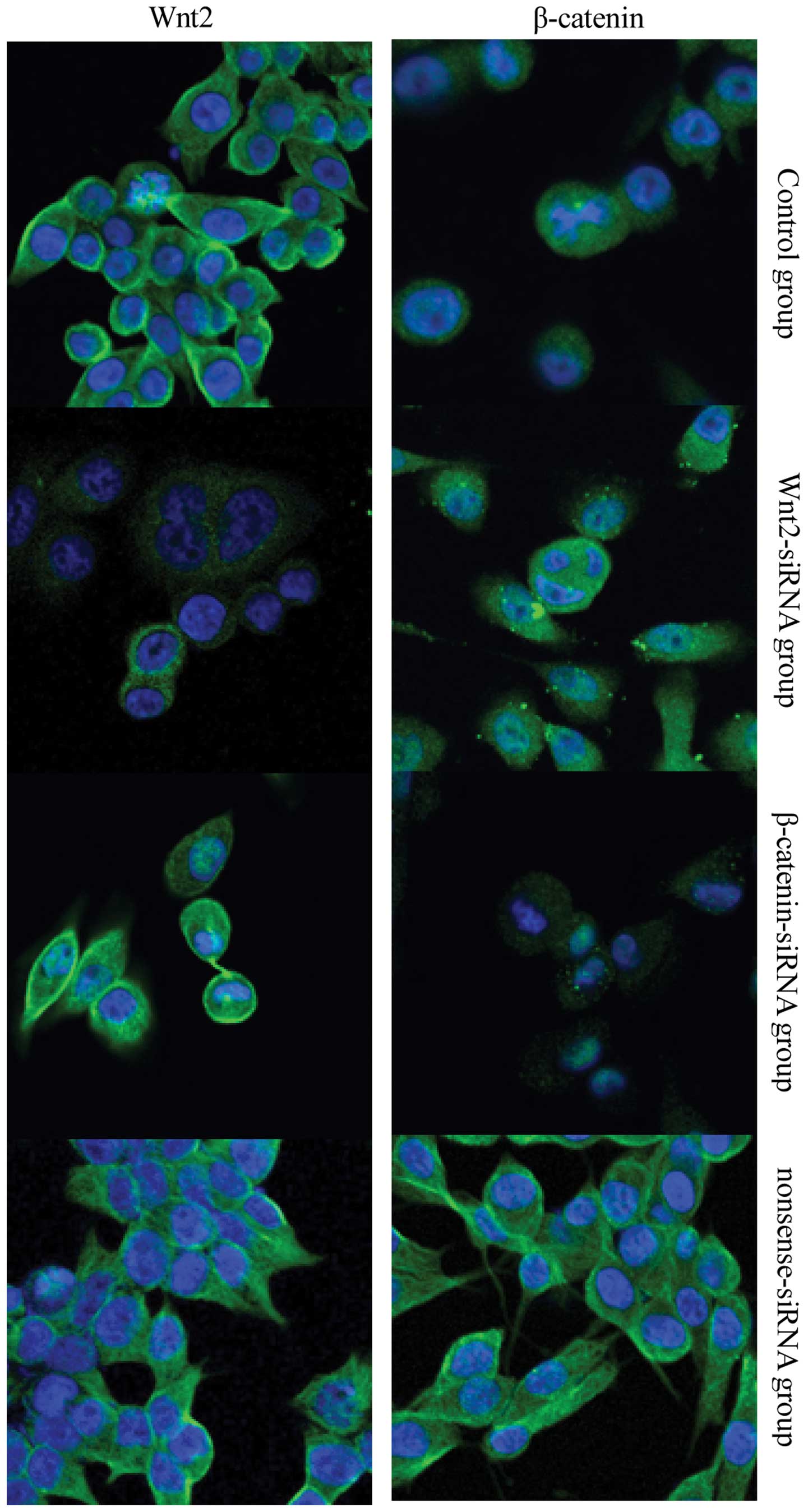|
1
|
Saxena A, Chua TC, Chu FC and Morris DL:
Improved outcomes after aggressive surgical resection of hilar
cholangiocarcinoma: a critical analysis of recurrence and survival.
Am J Surg. 202:310–320. 2011. View Article : Google Scholar : PubMed/NCBI
|
|
2
|
Lu D, Zhao Y, Tawatao R, et al: Activation
of the Wnt signaling pathway in chronic lymphocytic leukemia. Proc
Natl Acad Sci USA. 101:3118–3123. 2004. View Article : Google Scholar : PubMed/NCBI
|
|
3
|
Ilyas M: Wnt signalling and the
mechanistic basis of tumour development. J Pathol. 205:130–144.
2005. View Article : Google Scholar : PubMed/NCBI
|
|
4
|
Monga SP, Monga HK, Tan X, Mulé K,
Pediaditakis P and Michalopoulos GK: Beta-catenin antisense studies
in embryonic liver cultures: role in proliferation, apoptosis, and
lineage specification. Gastroenterology. 124:202–216. 2003.
View Article : Google Scholar : PubMed/NCBI
|
|
5
|
Micsenyi A, Tan X, Sneddon T, Luo JH,
Michalopoulos GK and Monga SP: Beta-catenin is temporally regulated
during normal liver development. Gastroenterology. 126:1134–1146.
2004. View Article : Google Scholar : PubMed/NCBI
|
|
6
|
Monga SP, Pediaditakis P, Mule K, Stolz DB
and Michalopoulos GK: Changes in WNT/beta-catenin pathway during
regulated growth in rat liver regeneration. Hepatology.
33:1098–1109. 2001. View Article : Google Scholar : PubMed/NCBI
|
|
7
|
Benhamouche S, Decaens T, Godard C, et al:
Apc tumor suppressor gene is the ‘zonation-keeper’ of mouse liver.
Dev Cell. 10:759–770. 2006.
|
|
8
|
Funato Y, Michiue T, Asashima M and Miki
H: The thioredoxin-related redox-regulating protein nucleoredoxin
inhibits Wnt-beta-catenin signalling through dishevelled. Nat Cell
Biol. 8:501–508. 2006. View
Article : Google Scholar : PubMed/NCBI
|
|
9
|
Lian Z, Liu J, Li L, et al: Enhanced cell
survival of Hep3B cells by the hepatitis B x antigen effector,
URG11, is associated with upregulation of beta-catenin. Hepatology.
43:415–424. 2006. View Article : Google Scholar : PubMed/NCBI
|
|
10
|
Higashi N, Kojima N, Miura M, Imai K, Sato
M and Senoo H: Cell-cell junctions between mammalian (human and
rat) hepatic stellate cells. Cell Tissue Res. 317:35–43. 2004.
View Article : Google Scholar : PubMed/NCBI
|
|
11
|
Guan CN, Chen XM, Lou HQ, Liao XH, Chen BY
and Zhang PW: Clinical significance of axin and beta-catenin
protein expression in primary hepatocellular carcinomas. Asian Pac
J Cancer Prev. 13:677–681. 2012. View Article : Google Scholar : PubMed/NCBI
|
|
12
|
Kaur P, Mani S, Cros MP, et al: Epigenetic
silencing of sFRP1 activates the canonical Wnt pathway and
contributes to increased cell growth and proliferation in
hepatocellular carcinoma. Tumour Biol. 33:325–336. 2012. View Article : Google Scholar : PubMed/NCBI
|
|
13
|
Loeppen S, Koehle C, Buchmann A and
Schwarz M: A beta-catenin-dependent pathway regulates expression of
cytochrome P450 isoforms in mouse liver tumors. Carcinogenesis.
26:239–248. 2005. View Article : Google Scholar : PubMed/NCBI
|
|
14
|
Tien LT, Ito M, Nakao M, et al: Expression
of beta-catenin in hepatocellular carcinoma. World J Gastroenterol.
11:2398–2401. 2005. View Article : Google Scholar : PubMed/NCBI
|
|
15
|
Tokumoto N, Ikeda S, Ishizaki Y, et al:
Immunohistochemical and mutational analyses of Wnt signaling
components and target genes in intrahepatic cholangiocarcinomas.
Int J Oncol. 27:973–980. 2005.PubMed/NCBI
|
|
16
|
Sugimachi K, Taguchi K, Aishima S, et al:
Altered expression of beta-catenin without genetic mutation in
intrahepatic cholangiocarcinoma. Mod Pathol. 14:900–905. 2001.
View Article : Google Scholar : PubMed/NCBI
|
|
17
|
Ku JL, Yoon KA, Kim IJ, et al:
Establishment and characterisation of six human biliary tract
cancer cell lines. Br J Cancer. 87:187–193. 2002.PubMed/NCBI
|
|
18
|
Takiyama I, Terashima M, Ikeda K, et al:
Establishment and characterization of a new human extrahepatic bile
duct carcinoma cell line (ICBD-1). Oncol Rep. 5:463–467.
1998.PubMed/NCBI
|
|
19
|
Tang WH, Yuan ST, Wang BS, Lu LJ, Ding J
and Yuan ZR: Establishment of a subcutaneous model of the human
extrahepatic bile duct carcinoma in nude mice via transplantation
of histologically intact tumor tissue. J Exp Clin Cancer Res.
23:661–667. 2004.PubMed/NCBI
|
|
20
|
Uematsu K, He B, You L, Xu Z, McCormick F
and Jablons DM: Activation of the Wnt pathway in non small cell
lung cancer: evidence of dishevelled overexpression. Oncogene.
22:7218–7221. 2003. View Article : Google Scholar : PubMed/NCBI
|
|
21
|
Davies JA, Ladomery M, Hohenstein P, et
al: Development of an siRNA-based method for repressing specific
genes in renal organ culture and its use to show that the Wt1
tumour suppressor is required for nephron differentiation. Hum Mol
Genet. 13:235–246. 2004. View Article : Google Scholar
|
|
22
|
Sangkhathat S, Kusafuka T, Miao J, et al:
In vitro RNA interference against β-catenin inhibits the
proliferation of pediatric hepatic tumors. Int J Oncol. 28:715–722.
2006.
|
|
23
|
Kim M, Lee HC, Tsedensodnom O, et al:
Functional interaction between Wnt3 and Frizzled-7 leads to
activation of the Wnt/beta-catenin signaling pathway in
hepatocellular carcinoma cells. J Hepatol. 48:780–791. 2008.
View Article : Google Scholar : PubMed/NCBI
|
|
24
|
Mazieres J, You L, He B, et al: Wnt2 as a
new therapeutic target in malignant pleural mesothelioma. Int J
Cancer. 117:326–332. 2005. View Article : Google Scholar : PubMed/NCBI
|
|
25
|
Zhao P, Lu Y, Zhong M, Liu L and Li B:
Inverse correlation of aberrant expression of fragile histidine
triad (FHIT) protein with cyclin D1 protein and prognosis in
Chinese patients with cholangiocarcinoma. Acta Oncol. 47:1557–1563.
2008. View Article : Google Scholar : PubMed/NCBI
|
|
26
|
El-Kady A, Sun Y, Li YX and Liao DJ:
Cyclin D1 inhibits whereas c-Myc enhances the cytotoxicity of
cisplatin in mouse pancreatic cancer cells via regulation of
several members of the NF-κB and Bcl-2 families. J Carcinog.
10:242011.PubMed/NCBI
|






















